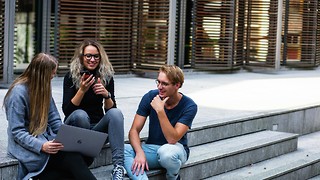Interview: Chloe Mashiter
Chloe Mashiter talks to Tom Powell about how she accidentally fell into directing, as well as the scale of opportunities Cambridge has for those interested in theatre
Chloe Mashiter’s Cambridge directing credits include taking Twelfth Night on a tour of Japan, 4.48 Psychosis and Cruel and Tender, alongside which she acted in a number of productions. Most recently, she’s devised and directed Zombie Haiku, which was selected for the International Student Drama Festival, Unconditional, which she also wrote, and is currently working professionally on A Progress with Carl Heap, who she first worked with during Much Ado About Nothing at the Arts Theatre.
What’s your first memory of theatre – what drew you to it?
I think I enjoyed playing dress up, because I remember being about 4 or 5 and being a dancer in a production of Puss in Boots at school. There were 25 of us in our year who were being dancers for this show, and only me and my one friend Bridget were prepared to put moustaches on our faces and be blokes to partner the girls. There were 2 blokes for about 23, 24 women. I remember thinking it was hilarious to have a moustache on my face – finding that very very fun, and it’s stuff like that attracted me to theatre.
Is that what keeps you coming back?
Yeah. Different styles of moustaches.
Seriously though, I really like the environment and the fact that you work with different teams of people – a cast or a crew or a production team, and having these people that you get to know, and have a laugh with. I’ve met – to get schmaltzy –some very lovely people through people, and that’s one of the best things about it, what keeps me coming back – the people that you work with.
How did you start directing?
Well I started out entirely by accident , because I was the only one who signed up as someone who was interested in directing to the Pembroke Players’ Fresher’s mailing list, so they asked me to direct their fresher’s play – so it was a combination of general curiosity and luck.
What do you want to do in theatre?
Well, I would’ve said only director until recently, but the positive responses to Unconditional that I’ve had has made me look more into writing as well as directing. I was immensely proud – it genuinely made people both laugh and cry. I definitely want to be a director, but I’m interested now in writing as well. It’s hard to think of a proper term for it, but devising and producing original material, as well as just interpreting or rendering pre-existing work.
What made you write Unconditional? What was the difference between your directing and wanting to write – what drew you to it?
I already had a huge number of unfinished or unworked or unperformed scripts on my laptop, so it wasn’t the first time I’d sat down and tried to write something. There was the impetus of it being my final year at Uni, so I think there was a sense that time was running out to have a go at it. And friends of mine had written scripts, or were writing scripts that were being performed, and that made me realise there wasn’t a real excuse for me, I couldn’t say “oh I’m too busy”. And then I stumbled upon something that I actually wanted to write about, and I found it easier than before to write about.
What, more broadly, do you think the role of taboo of is in theatre and what leads your attraction to it?
That depends what you think the role of theatre is. I think personally gravitate towards theatre being - it’s hard to say this without sounding pretentious – a forum for discussion. The joy of theatre that involves taboo is that it’s not a dry report, or article or legal document you’ve got – it presents an actual case of genuine people. I think that’s the most appropriate way to engage with taboos and to see whether something is right or wrong; to engage with actual instances and the actual people who behave in this supposedly taboo manner. I think theatre is a useful medium in which to discuss taboo subjects – because of the fact that you’ve got people there in front of you reminds you that ultimately, these things are just about how people work.
How do you approach directing?
I like to think I’m quite spontaneous, that a lot of improvisation and a lot of freedom is allowed in my rehearsal process. It’s not very strict and not very formal, I don’t like sitting down and talking about things that much, I would much rather be up doing things, and only talk about things if there’s a problem.
I’m very much of the mind that directing should be collaborative and the director’s role is to be offering the actors options or helping to show them how they might do something. Giving them the tools to make their own decisions and choices as how things work. That’s something I’ve started to think only relatively recently, because it requires a certain amount of giving up of control – a line may not be done a specific way you imagine it in your head, which can at times be frustrating, but I think at other times it’s a lot more healthy because it means it’s more driven by performances. Having an overall coherent and general approach, rather than being piecemeal, or focussing on individual lines and parts of the show – that’s how I approach it.
What advice would you give your first term self?
Christ! Remember that being reviewed by three different student newspapers is weird. It’s not the norm at other universities, and whilst it’s a part of theatre here, it should not become the focal point of your production. I tried to remember that, but sometimes it’s hard to. But I think that remembering that is in a certain sense odd is helpful. And – this is a piece of advice I’d like to give myself, but I don’t think it would really help at all – and that would be to not be so intimidated by the ADC. I’m not sure how much help that would be to my first term self anyway; she would continue to be intimidated by the ADC.
Why is that?
You go in and there’s a big list of famous people on the wall of people who have performed or worked there, it’s sold as a big centre, and it’s where the shows with the biggest budgets are, and because it’s the largest venue, it’s also imposing in that sense. And because a lot of people do focus on the ADC, it’s easy to forget the value of other venues. I think it’s easy, as a fresher, to get a bit overwhelmed by the ADC’s prestige and the scale of the shows there.
Do you think that your acting experience has affected the way you approach directing?
Yes.
Pause.
It’s the best way to learn from others, about the way they go about directing – it’s made a massive difference in ways that are difficult to specify.
What would you say your biggest theatrical influence is?
There are shows I’ve liked, venues and approaches I’ve liked, things that I’ve seen. I guess one of my biggest influences is Carl Heap, who I assistant directed with on Much Ado. Mainly because he was the first professional director I worked with. He was always so so focussed on storytelling and on the idea of the actors telling the audience a story, and that has really stuck with me and has now become a central tenet for me. I think it’s a good thing to go by –you always remember the audience is there.
I think telling a story has an important simplicity to it so that you don’t get bogged down in concepts, or lose yourself in extravagant ideas or interpretations and you remember that at the end of this, you’re telling people a story. I guess that’s quite an important influence that I hope is evident in all of my productions.
I feel it also applies quite heavily to physical theatre, which I’ve recently got quite into, because you can see physical theatre just used as another skill to show off, but I think it should only be used to help tell stories, and I find it highly irritating when it’s there superfluously. There are other ones as well.
So yeah, thanks for that Carl.
Is there anything we haven’t touched upon you’d like to leave us with?
This might sound really pretentious and really self-important, and I’m not trying to say that I’ve always done this, or that it’s necessarily right, but Leeds University put on a total of 9 shows a year and we put on about 40 shows a term. I think it’s very easy for us to forget about the opportunities, resources, venues that we have, and to forget how much we have here – and I think it’s important for us to use all those opportunities to the fullest, because it’s never going to be as easy to put on a show as it is at this university.
So I think... it’s important to remember that this is the best chance you’ll ever have in theatre to experiment and to take risks. Other universities don’t even do double figures and we do forty shows a term. So make the most of it.
 News / British Academy elects 12 Cambridge academics22 July 2025
News / British Academy elects 12 Cambridge academics22 July 2025 News / Lord Smith elected Cambridge chancellor23 July 2025
News / Lord Smith elected Cambridge chancellor23 July 2025 News / Right-wing group calls for charges over Balfour portrait vandalism24 July 2025
News / Right-wing group calls for charges over Balfour portrait vandalism24 July 2025 Lifestyle / Keeping the spark alive (platonic edition)24 July 2025
Lifestyle / Keeping the spark alive (platonic edition)24 July 2025 Comment / Stop disarming people of their nuance23 July 2025
Comment / Stop disarming people of their nuance23 July 2025







